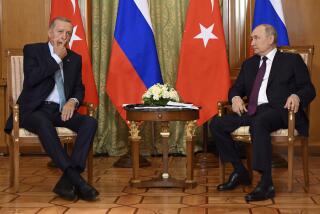Farming Goliaths Relent
- Share via
Developing nations unexpectedly stood their ground during a World Trade Organization meeting in Cancun, Mexico, last year with their bold demand that richer nations abandon massive agricultural export subsidies that spell ruin for small farmers in poor countries. The revolt fizzled, however, and its frustrated leaders left town empty-handed. More proof, it seemed, that richer countries (notably those in the European Union) felt free to continue the estimated $300 billion in subsidies that make it impossible for poor countries to use agricultural exports to revive their troubled economies.
A global trade agreement reached last weekend in Geneva by 147 WTO member governments revived this seemingly dead issue, but it will take goodwill and a cessation of political potshots to see it to completion.
Though little more than a bare-bones framework, the agreement feeds hope among farmers in West Africa and other developing regions that they won’t have to compete hopelessly against government-subsidized cotton farmers in the United States and the EU’s heavily subsidized dairy industry.
The Bush administration, particularly U.S. Trade Representative Robert Zoellick, deserves credit for pushing this change, a potentially risky move during an election year. He’ll have to keep up pressure on other developed countries to drop high tariffs that keep out U.S. and other goods. The changes that Zoellick helped forge ought to be left outside the presidential politics of the next few months, even though globalization was among the chief villains of Democratic vice presidential candidate John Edwards’ primary campaign for the presidential nomination. A global economic downturn could stall or derail the negotiations because tough times ignite protectionist fervor. So could pressure in the U.S. to tie trade liberalization to demands that foreign governments adhere to basic labor rights and environmental protections.
Negotiators also must flesh out the framework, including how quickly agricultural subsidies for cotton, rice, soybeans, wheat and other crops would be cut back.
The World Bank estimates that truly free trade in the agricultural sector could help lift about 150 million people in developing countries from poverty within a decade. Negotiators should keep that number in mind when they return to the table in September, as should politicians seeking every possible vote in the Nov. 2 elections.
More to Read
Sign up for Essential California
The most important California stories and recommendations in your inbox every morning.
You may occasionally receive promotional content from the Los Angeles Times.










